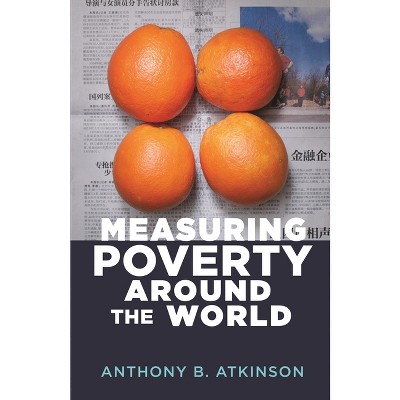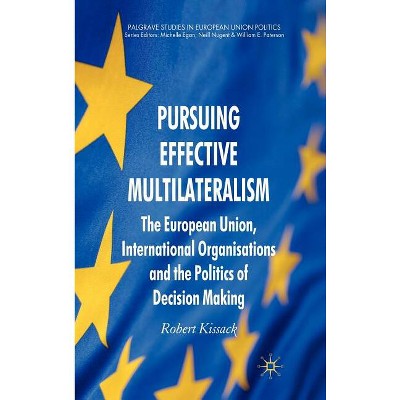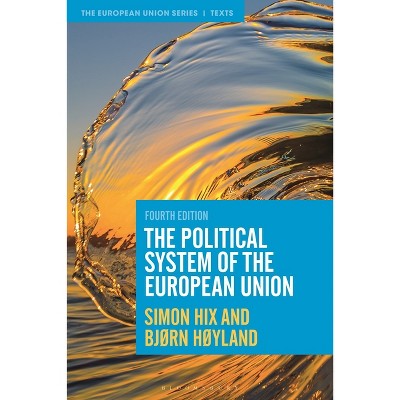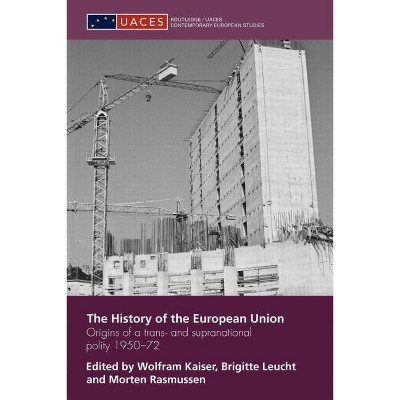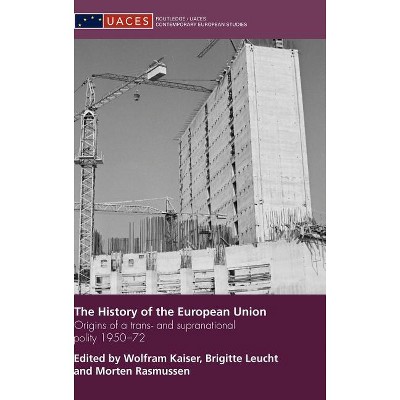Measuring and Monitoring Absolute Poverty in the European Union - (Hardcover)

About this item
Highlights
- Fueled by the recent cost of living crisis and compounding social policy challenges, absolute poverty measurement is rapidly gaining relevance in many advanced economies.
- About the Author: Balint Menyhert, the lead author, is an economist and former research fellow at the Joint Research Centre of the European Commission.
- 443 Pages
- Business + Money Management, Development
Description
Book Synopsis
Fueled by the recent cost of living crisis and compounding social policy challenges, absolute poverty measurement is rapidly gaining relevance in many advanced economies. Focusing on individuals' and households' minimum financial needs, absolute measures of poverty are well suited to support adequate social protection schemes and time-consistent social monitoring.
The current open access publication gives a comprehensive overview of the art and science of absolute poverty measurement in an EU-wide context. It summarizes the lessons learnt from the ABSPO exploratory research project carried out by the European Commission, tasked with designing and implementing the first cross-country comparable measurement of absolute poverty in the EU. Presented as a methodological handbook for practitioners and social policy experts, the relevant material covers all aspects of the measurement process and offers a novel framework, innovative methodologies and pioneering data analysis. Taking a decidedly forward-looking and international approach to poverty thinking, ABSPO measurement tools help identify new forms and patterns of social exclusion among European societies that call for further research, improved social monitoring and effective policy action.
From the Back Cover
Fueled by the recent cost of living crisis and compounding social policy challenges, absolute poverty measurement is rapidly gaining relevance in many advanced economies. Focusing on individuals' and households' minimum financial needs, absolute measures of poverty are well suited to support adequate social protection schemes and time-consistent social monitoring.
The current open access publication gives a comprehensive overview of the art and science of absolute poverty measurement in an EU-wide context. It summarizes the lessons learnt from the ABSPO exploratory research project carried out by the European Commission, tasked with designing and implementing the first cross-country comparable measurement of absolute poverty in the EU. Presented as a methodological handbook for practitioners and social policy experts, the relevant material covers all aspects of the measurement process and offers a novel framework, innovative methodologies and pioneering data analysis. Taking a decidedly forward-looking and international approach to poverty thinking, ABSPO measurement tools help identify new forms and patterns of social exclusion among European societies that call for further research, improved social monitoring and effective policy action.
Bálint Menyhért is an empirical economist and former research fellow at the Joint Research Centre of the European Commission.
Zsombor Cseres-Gergely is a policy economist and former research fellow at the Joint Research Centre of the European Commission.
Virmantas Kvedaras is an applied econometrician and former research fellow at the Joint Research Centre of the European Commission.
Benedetta Mina is an economist and former research assistant at the Joint Research Centre of the European Commission.
Filippo Pericoli is a quantitative economist and former research fellow at the Joint Research Centre of the European Commission.
Slavica Zec is a statistician and former research fellow at the Joint Research Centre of the European Commission.
About the Author
Balint Menyhert, the lead author, is an economist and former research fellow at the Joint Research Centre of the European Commission. His research interests include applied micro- and macroeconomics, labour markets, socio-economic inequalities and economic history. He holds a PhD from the Central European University and has previous work experience from the World Bank, the OECD, the Hungarian Financial Supervisory Authority and the Federal Reserve Banks of Boston and New York.
Zsombor Cseres-Gergely is an economist working in evidence-informed policymaking at the European Commission. He is a former research fellow at the Joint Research Centre of the European Commission and the Institute of Economics of the Hungarian Academy of Sciences. He holds a PhD from the Central European University following studies at the University College London and the Corvinus University of Budapest.
Virmantas Kvedaras is an applied econometrician and former research fellow at the Joint Research Centre of the European Commission. He holds a Phd from the Vilnius University where he had previously worked as an associate professor at the Faculty of Mathematics and Informatics.
Benedetta Mina is a PhD candidate in Economics and Finance at the University of Rome Tor Vergata and a former research assistant at the Joint Research Centre of the European Commission. Her research interests lie at the intersection of public finance and environmental economics. She currently holds a position as an economist at the Italian Parliament.
Filippo Pericoli is an economist and former research fellow at the Joint Research Centre of the European Commission. His expertise lies in quantitative methods of statistics, econometrics and data science. He holds a PhD from the Sapienza University of Rome and is currently affiliated with the European Monitoring Centre for Drugs and Drug Addiction.
Slavica Zec is a statistician and former research fellow at the Joint Research Centre of the European Commission. She holds a PhD from the University of Padova and worked previously at the Research Institute for the Evaluation of Public Policies in Trento (FBK-IRVAPP). She is currently senior researcher at Fondazione Nord Est.
Shipping details
Return details
Trending Business & Law Books






